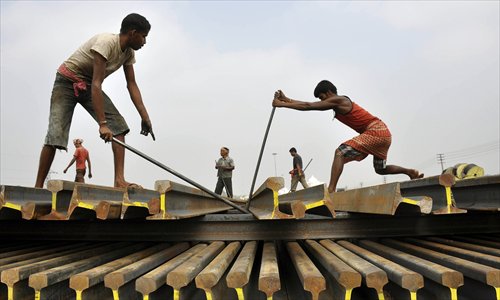HOME >> WORLD
India aims to invest $137b in railways in next 5 years
Source:Reuters Published: 2015-2-26 22:13:01

Indian laborers use iron bars to stack railway tracks at a railway station in Agartala, India, on Thursday. India's rail minister has promised to revive the country's railways through reforms, to take forward Prime Minister Narendra Modi's economic agenda, as he prepares to present his government's rail budget. Photo: AFP
India's government unveiled plans on Thursday to invest $137 billion in its decrepit rail network over the next five years, heralding Prime Minister Narendra Modi's aggressive approach to building infrastructure needed to unlock faster economic growth.
Over the next year, India will increase investment by about a half to 1 trillion rupees including funds raised by market borrowing.
To meet the five year target, investment will have to speed up even more after that, leaving economists questioning where the money would come from as the government has to rein in its fiscal deficit.
Presenting the rail budget two days before India's federal budget - also expected to hike infrastructure spending - Railway Minister Suresh Prabhu shied away from hiking passenger fares to finance the upgrades, but raised freight rates.
Modi, who called the rail budget "a paradigm shift" is expected to use Saturday's federal budget to lay out an economic vision focused on building the roads, power and technology needed to make India a leading global economy.
While India has the world's fourth largest rail network, it has been outstripped by China, which now has more than six times as much track following an intensive expansion and modernization of its network over the past two decades.
Providing jobs for 1.3 million people, the railway is India's largest single employer, and reform is politically sensitive.
The finance ministry increased federal funding for the railway to 400 billion Indian rupees from 301 billion Indian rupees budgeted in 2014/15.
The minister said spending would be focused on improving and expanding existing railway lines, many of which are operating at more than full capacity, with the average speed of the country's best trains a sluggish 70 kilometers per hour.
Posted in: Central & South Asia